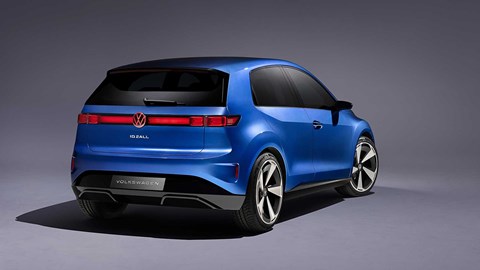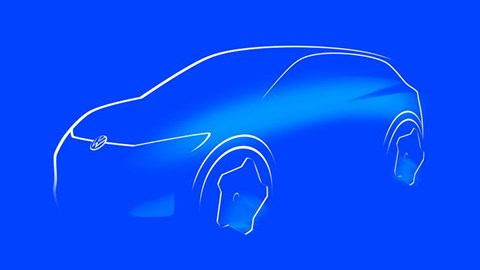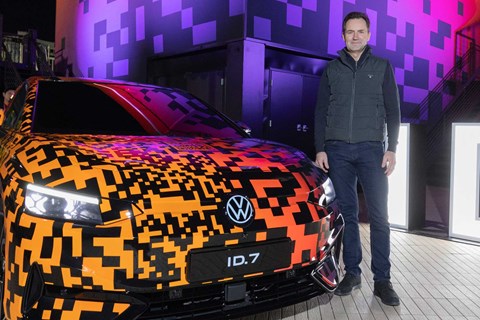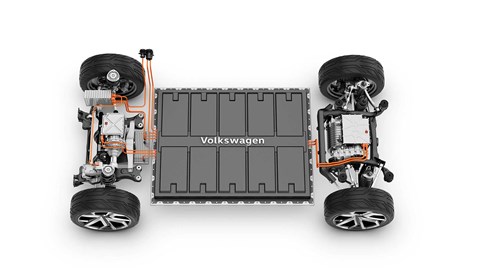► Entry-level Volkswagen ID.2 EV previewed
► Starting price of around £22,000 expected
► ID.2 here in 2025, ID.2 X crossover in 2026
The long-awaited small electric Volkswagen will arrive in two years’ time with a pair of more affordable EVs: the ID.2 Urban city car, previewed by the VW ID. 2all show car, and the crossoverised ID.2 X, teased in a new official picture released by Wolfsburg (above).
Prices are hardly bargain-basement, but the dream of cheaper electric cars is getting closer: this duo will be priced from around €25,000 (£22,000), as Wolfsburg calculates how to make EVs at scale at lower prices. Expect a partner to be found in a bid to drive down development costs.
Volkswagen has been kicking around the idea of an entry-level electric car for some time now to accelerate its electrification programme.
Back in 2021, the brand launched the ID.Life concept, offering a glimpse at how its more attainable new EVs could look, and then in spring 2023 the ID.2all show car (below) fleshed out more detail.

It is believed to accurately reflect the design and footprint conceived for the ID.2 production hatchback.
The upcoming electric supermini hatchback is due in 2025 and will be positioned as a direct rival for the upcoming Renault 5 EV.
Volkswagen’s official sketch shows a roofline, short front end and five-spoke wheels similar to the larger ID.3 electric hatchback’s, as are the slim daytime-running lights spanning the car’s face.

The ID.2 will be pitched as a zero-emission alternative to the Volkswagen Polo, but it’ll be based on a new, more cost-effective version of the group’s electric platform. Look out for the first front-wheel drive version of MEB, decontented for a cheaper price point.
VW ID.2 small electric car: prices and timelines
Thomas Schafer, CEO of Volkswagen, told CAR the smallest EV was scheduled to arrive in about two years’ time. ‘The small electric cars come in 2025-2026 – there will be four cars between Volkswagen, Skoda and Cupra built in Spain. They will replace the combustion engine vehicles for our small vehicles. It makes no sense making small cars meet EU7. It would add £3000-5000 more to the cost. It would make small vehicles unaffordable.’
Originally, VW had planned to launch the car for a price point of, or just below, €20,000 (£17,600). Schafer added that this was still the ultimate goal. ‘The smallest car will be our ID.2. It will be well beyond €25,000. Is that the end point? It can’t be. The reality is we need to get something below the €20,000 mark. It is not confirmed yet.

‘The team is working on ideas how we now get into the area below €20k. We have not found the solution yet. There is a reason why all the manufacturers do electric cars from big to small and inch their way down. I personally think it can be done. We will probably have to talk about range. What is really necessary in such a vehicle? How many variants of it do you really need? Battery costs at the moment are the deciding factor.’
Batteries are easily the most expensive part of an electric car, due to the rare earth materials that are required to make them. For the ID.2, we expect Volkswagen will trim the battery capacity down to around 45kWh.
Electric performance, specs and range
Our sources suggest that the VW ID.2 Urban is a city runabout not unlike the five-door Up in character, fitted with a small 45kWh battery and a 150bhp base motor for a maximum range of 260 miles.
The chunkier ID.2 X is a slightly taller, more SUV-flavoured design, but will share the same drivetrain, internally dubbed MEB Small.

The ID.2 twins will be a pivotal range for Volkswagen. They’ll pull the price of the company’s entry-level electric and petrol cars closer together, making the jump to an EV more appealing to those on low incomes. It should also boost the brand’s sales – which is important, given that Volkswagen is planning for EVs to make up 70 percent of its European sales by 2030.
How’s Volkswagen going to build these new EVs?
With a little help from its friends, of course. Seat has been assisting with the Volkswagen Group’s small electric car project – and in May 2022, Volkswagen and SEAT set aside a total of €10 billion (roughly £8.5 billion) to build an electric vehicle production hub in Spain.
Some of this cash will be spent on a new gigafactory in Valencia, which will supply the battery packs for both Seat and Volkswagen future electric cars. Construction of the plant will start in 2023, with the first cells set to roll off the production line in 2026. For some extra eco-points, 20 percent of the factory’s energy demands will be met by a new solar farm located around six miles from the facility.
Further electric car reading
Best electric cars on sale today
Volkswagen’s electric cars: everything you need to know
How much does it cost to charge an electric car?